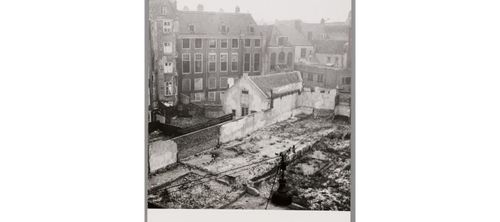The Jewish Street: Amsterdam and Paris After 1945

Jewish urban landscapes throughout Europe changed irreversibly during the mid-twentieth century. Taking the concept of the “Jewish street” and zooming in on French and Dutch case studies, our lectures will analyse what happened to Jewish sites and quarters between the 1930s and the 1960s, with an emphasis on the post-war period.
In some ways, the post-war histories of the Rue des Ecouffes, a street of the Pletzl, perceived as a Jewish neighbourhood from the 1930s, and the Rapenburgerstraat, in what had been the Jewish quarter of Amsterdam for centuries, ran completely opposite. Seventy-five per cent of French Jews survived the Shoah and built a life again in the city, while an equal percentage of Dutch Jews were murdered. In Paris, survivors returned to a cityscape which, on the surface, had remained almost intact, while Jews in Amsterdam were faced with a district heavily impacted by wartime destruction. While the Pletzl retained a Jewish character, a large part of Amsterdam’s Jewish quarter fell prey to urban renewal. Nevertheless, as relatively smaller streets in Jewish neighbourhoods with a diverse and lively pre-war Jewish life, both the Rue des Ecouffes and the Rapenburgerstraat allow for an in-depth analysis to answer questions such as: What actually makes a street – or a neighbourhood – Jewish? And how can streets, as microcosms, offer suitable lenses on the (re)building of Jewish life in the post-war period?
Bart Wallet will introduce the concept of the “Jewish street,” after which Sarah Gensburger and Eric Le Bourhis will give a lecture on the Rue des Ecouffes, and Sietske van der Veen will highlight the Rapenburgerstraat in her lecture.
About the speakers
Bart Wallet is professor of Jewish studies: early modern and modern Jewish history at the University of Amsterdam. His research specialisms include Jewish urban cultures, Amsterdam Jewish history, and Jewish cultural and public history. With his team he is conducting research projects on the postwar history of Jewish quarters and their public history. Together with Tirtsah Levie Bernfeld he published Jews in the Netherlands: A Short History (2023).
Sarah Gensburger is a full research professor in political science, a sociologist of memory and a historian of the Holocaust at the CNRS and Sciences Po Paris. She published 15 books among which, in 2015, Witnessing the Robbing of the Jews. A Photographic Album, Paris 1940-1944 (Indiana University Press) and in 2025, together with Isabelle Backouche and Eric Le Bourhis, she published Appartements témoins. La spoliation des locataires juifs à Paris, 1940-1946 (La Découverte, 2025). She is the author of the podcast series Voices of the Holocaust in Paris.
Eric Le Bourhis is a historian and maître de conférences at Institut National des Langues et Civilisations Orientales in Paris. He has published several works on urban history and the history of the Shoah, in France and the Soviet Union. Together with Isabelle Backouche and Sarah Gensburger, he published Appartements témoins. La spoliation des locataires juifs à Paris, 1940-1946 (La Découverte, 2025). Together with Irina Tcherneva and Vanessa Voisin, he co-edited Seeking Accountability for Nazi and War Crimes in East and Central Europe: A People’s Justice? (University of Rochester Press, 2022).
Sietske van der Veen is a historian of Jewish history and a postdoctoral researcher at the University of Amsterdam, where she is involved in the development of a centre of expertise in Jewish urban studies. Her research interests include Jewish sites and quarters, spatial experiences of Jews, Jewish elites, and Jewish belonging in the modern period. In her current project, she focuses on Jewish places and spaces in Amsterdam after 1945.